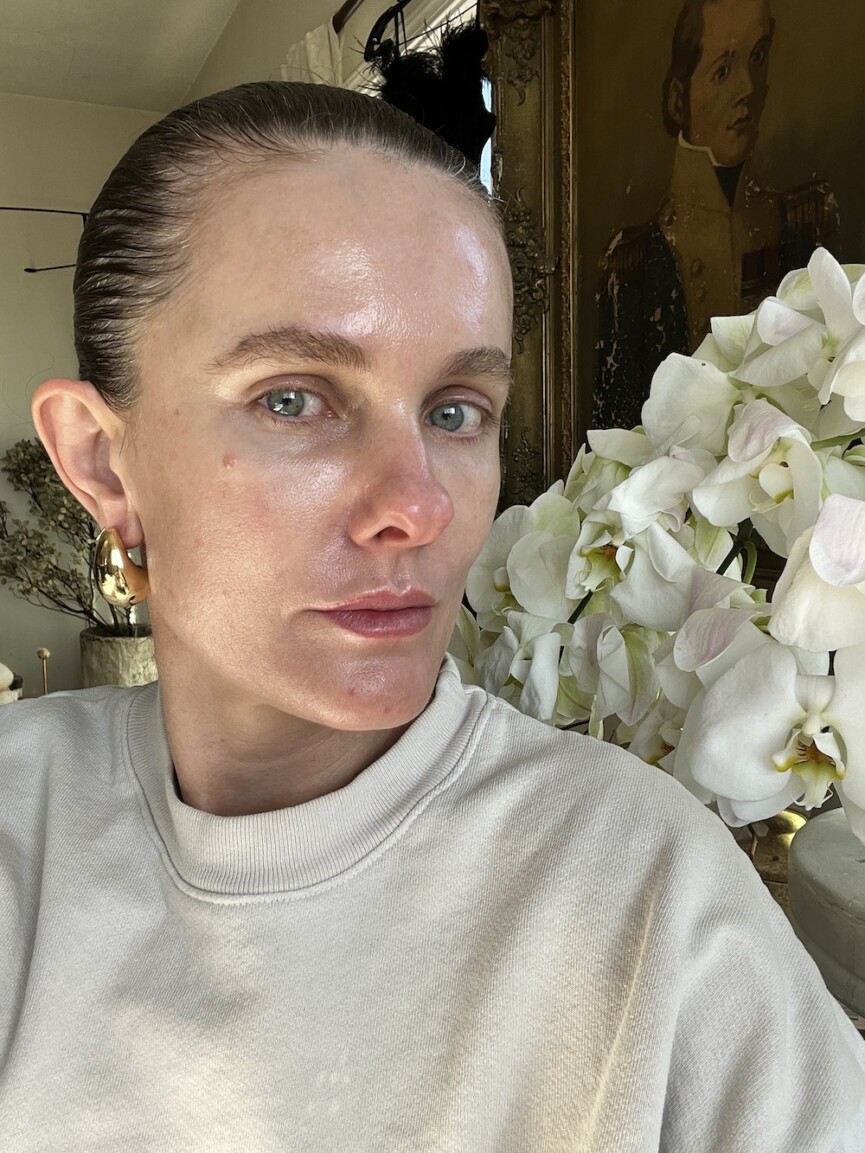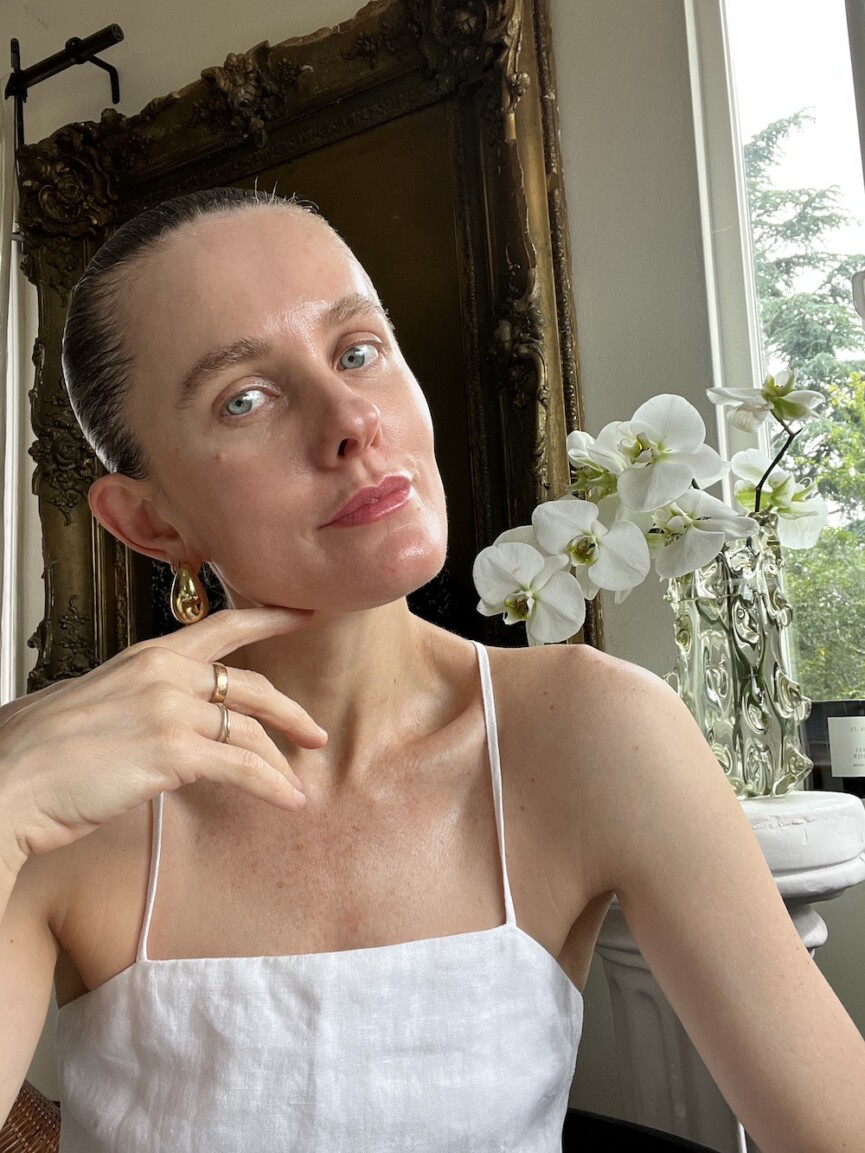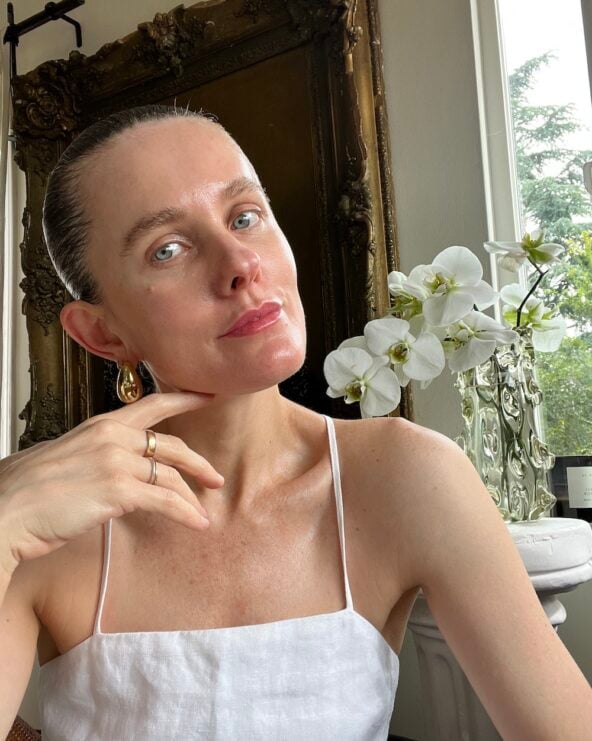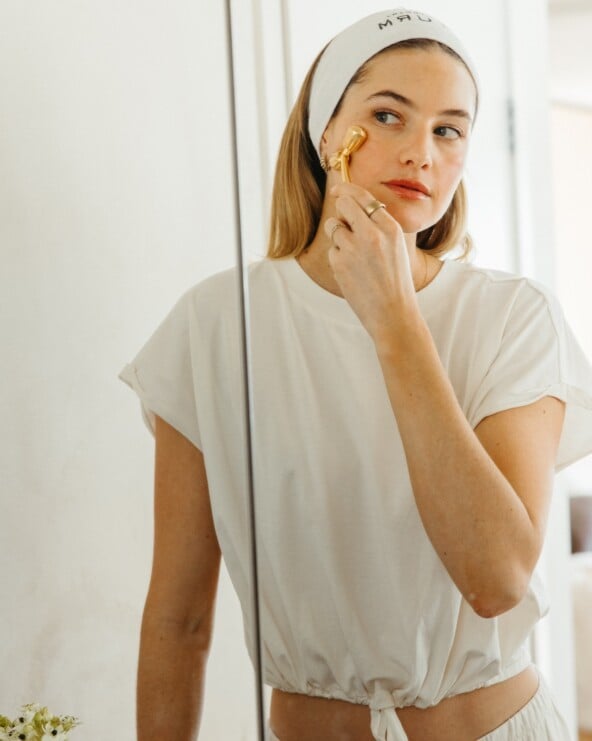Editor’s note: This story highlights the intensive skincare treatment, PRFM. Videos below show the cosmetic procedure in process, which includes the use of needles.
Growing up under the harsh Australian sun, you’re taught to apply and reapply sunscreen from a very early age. (The Slip, Slop, Slap campaign is ingrained in my memory!) So, since the spry age of 14, I have taken a fairly disciplined approach to skincare. While I wouldn’t say I’m a guinea pig when it comes to beauty treatments, I’m the first to raise my hand when an exciting advancement in technology comes on the market. My goal? Prevention over cure.
This philosophy also extends to skincare. If you’re not taking care of your skin health with a daily routine (vitamin C, retinol, and sunscreen are key!), then you’re really not going to see the best results from a professional treatment. I have spoken to SO many estheticians and dermatologists over the years, and while they have their favorite laser, peel, injectable, etc. they all say the best results occur when you have a consistent at-home skincare routine. Not a single beauty treatment I’ve tried would have the efficacy it did if I didn’t practice diligent skincare.
With that disclaimer in mind, let’s get to the newest game-changing treatment I can’t stop talking about: PRFM—i.e., Platelet-Rich Fibrin Matrix.


I Tried PRFM—Here’s What to Know
Now that I am 43, I wanted an alternative to filler. It’s not that I’ve stopped having filler or think that it’s bad. On the contrary, I love a little baby filler to help with the inevitable bone loss on my face. (I had my first under-eye filler at 37.) That said, you want to be careful not to overdo it, and I was starting to feel like my under-eyes still needed a little extra support to strengthen the thin, crepey skin.
So I went to see my favorite and most trusted RN, medical aesthetic provider and founder of The Things We Do, Vanessa Lee. She also did my cheek, lower jawline, and brow thread lift a few years ago—which is still looking snatched thanks to the new collagen production and skin strengthening as a result. Lee and her team (she trains them all personally) is the ONLY person I would recommend to administer threads in LA.
Given the amazing results of my PRFM, I think they’re a great alternative for those either looking to enhance their under-eye filler or want an alternative option. I did have a little bruising afterward but nothing I couldn’t cover up with makeup. And as you can see, my skin around that area looks healthy and strong.
Not sure if it’s right for you? I sat down with Lee after my treatment to get the lowdown on PRFM—how it works, healing time, cost, and so much more.
What is PRFM? What does it stand for and how did it become a cosmetic treatment?
PRFM stands for Platelet-Rich Fibrin Matrix. It’s a treatment that utilizes a concentrated form of your own blood’s platelets and growth factors to rejuvenate and enhance the appearance of the skin. PRFM is the next generation of PRP science. We can now use the growth factors from your own blood to create a thin, gel-like matrix of growth factors and place it into your thinning tissue. Compared to PRP, PRFM is much more concentrated, allowing for greater longevity and better results.
How does PRFM work?
PRFM works by harnessing the body’s natural healing and rejuvenating processes. It’s 100% natural. The procedure involves drawing a small amount of the patient’s blood, which is then processed by centrifuge to separate the platelets and growth factors from the rest of the blood components. We like to call it liquid gold!
This concentrated PRFM is then injected into specific areas of the skin, promoting collagen production, tissue regeneration, and improved skin texture and tone.
When would you recommend PRFM to someone?
PRFM is great for anyone wanting to enhance their skin’s texture, tone, and elasticity. It’s especially useful for addressing fine lines, wrinkles, acne scars, and signs of aging or damage. PRFM can also complement other aesthetic treatments. It can be done by itself or to complement fillers and/or threads.
PRFM is especially useful for addressing fine lines, wrinkles, acne scars, and signs of aging or damage.
Who is the right candidate for PRFM?
Almost anyone! The right candidate for PRFM is typically someone in good general health who wants to address skin concerns such as fine lines, wrinkles, and texture irregularities. It can be suitable for various ages, but it’s more commonly considered by individuals in their late 20s to 50s. It’s also pregnancy-safe! Those with certain medical conditions, blood disorders, or severe skin issues might not be suitable candidates. A consultation with a qualified provider is necessary to determine candidacy.
Why is PRFM so effective?
PRFM’s effectiveness is attributed to the growth factors and platelets it delivers to the skin. They stimulate collagen production, improve blood circulation, and enhance tissue regeneration, resulting in smoother, more youthful-looking skin.
Are you seeing more people opt for PRFM versus filler?
Sometimes PRFM is recommended as the first step in a patient’s beauty plan and filler as the second step a few months later. PRFM’s job is to help support and thicken skin tissue before it’s the filler’s turn to provide the structural reinforcement for facial harmony. Think of PRFM as the glaze to facial balancing.
When would you recommend filler over PRFM?
Dermal fillers are recommended when volume restoration is the primary goal, such as plumping up hollow cheeks or enhancing the lips. Fillers provide immediate results by adding volume to specific areas, whereas PRFM focuses on overall skin improvement and rejuvenation.
How do you know PRFM is right for you?
PRFM might be right for you if you’re looking to improve skin texture, tone, and overall appearance without adding significant volume. We always recommend a consultation to determine if PRFM aligns with your goals and if it’s the right treatment for you.
You are always at the forefront of new technology and procedures in cosmetics. When did you first learn about PRFM and how long have you been offering this treatment at The Things We Do?
PRFM caught our attention as an innovative cosmetic approach, and we swiftly integrated it into our practice at The Things We Do a few years ago. Our decision to offer PRFM was driven by our commitment to providing our patients with safe and effective treatments that align with the desire for natural-looking results. PRFM resonated with our philosophy of utilizing the body’s own resources for rejuvenation, and we recognized its potential to address a wide range of skin concerns.
Where can you get PRFM?
The most popular treatment areas include the face, under-eyes, neck, décolletage, and hands. PRFM can improve skin texture, reduce fine lines, and minimize acne scars. It’s also super effective at tightening and plumping the skin.
How long does the treatment take?
One PRFM treatment typically takes about 60 minutes, depending on the treatment area.
When can you expect to see results?
Results from PRFM treatment become noticeable gradually over several weeks as collagen production is stimulated and tissue regeneration occurs. Over several months, you’ll notice the results continue to improve.
What is the downtime?
PRFM treatments usually involve minimal downtime. Some redness, swelling, and bruising at the injection sites may occur, but these side effects are generally mild and temporary.
How should you take care of your skin post-PRFM?
After a PRFM treatment, be sure to:
- protect your skin from the sun
- use gentle cleansers
- stay hydrated with mild moisturizers
- avoid intense activities
- skip makeup initially
- follow your provider’s guidelines
How long does it last?
The duration of PRFM results varies from person to person, but most can expect improvements to last between 1-2 years. Maintenance treatments can help you get the most out of your results.
Do you need a follow-up appointment?
A follow-up appointment is often scheduled 4-6 weeks after treatment to monitor your progress and discuss any additional treatments or adjustments if needed.
How many treatments do you recommend?
The number of recommended treatments varies based on your specific needs. Some achieve desired results with a single treatment, while others might benefit from a series of treatments spaced a few months apart.
How much does it cost?
The cost of PRFM treatments can vary widely based on factors such as location and the number of treatment areas.


What questions should you ask yourself before getting PRFM?
Before getting PRFM, it’s important to consider your specific skin concerns, your expectations for results, and your commitment to follow the post-treatment care instructions. Evaluate your overall health and any medical conditions that might affect your eligibility for the treatment.
How do you find a good provider?
Finding a qualified provider is crucial for safe and effective PRFM treatment. Ask about their training and experience with PRFM. Be sure to find someone who will truly advocate for you.
What are possible complications that can result from PRFM?
Complications from PRFM treatments are typically rare. However, potential risks can include infection, bruising, and adverse reactions to the injection. To avoid these issues, choose a reputable provider, be transparent about your medical history, and follow pre- and post-treatment instructions.
If you experience any unusual or severe side effects, consult your provider as soon as possible.







